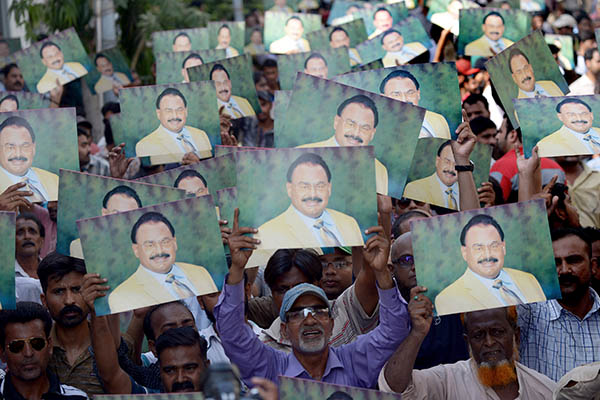Karachi shuts down as city fears violent retaliation from protesters over London arrest of Altaf Hussain.
The powerful exiled leader of the Muttahida Qaumi Movement (MQM), Altaf Hussain, was arrested in London on Tuesday on suspicion of money-laundering as thousands of people in Karachi staged a rally calling for his release.
For over two decades, Hussain has wielded effective control over the metropolis from his London suburb, addressing supporters through a loudspeaker linked to his home telephone.
Staunchly secular and dominated by the Mohajir ethnic group who migrated from India at the time of Partition, the MQM describes itself as a bulwark against Talibanization—but critics say it is also responsible for much of the violence that wracks Pakistan’s biggest city. Hussain’s arrest, confirmed by the government, has sparked fears of a major backlash there.
British police said only that a 60-year-old man had been detained at a residential address in northwest London on suspicion of money laundering, and that officers were searching the building. A few hours later, the MQM announced a major protest and said they would block Karachi’s main M. A. Jinnah thoroughfare until Hussain’s release.
“Everyone should come to endorse his or her love and solidarity to Altaf Hussain,” said Haider Abbas Rizvi, a senior party official.
Around 4,000 people had reached the Numaish Chowrangi intersection by evening, with many more expected to join them throughout the night and into today.
Panic had earlier gripped the sprawling city of 20 million soon after local television broadcast the news. Angry protesters torched at least a dozen vehicles, according to officials. Many residents rushed to stock up on groceries in anticipation of a prolonged shutdown, while office workers left for home early, clogging up roads.
“We don’t know for how long the shops will remain closed and I want to store as much groceries as I could,” Razia Begum, 45, said as she jostled for space in a packed shop.
British officials said they had temporarily closed their deputy high commission in Karachi, as police strengthened security in the city’s diplomatic enclave. “We have tightened the security of the consulates, especially of the British,” said city police chief Ghulam Qadir Thebo.
The Karachi Stock Exchange plunged three percent on the news, from 29,784 points to 29,009 points, while train services were halted.
The office of Prime Minister Nawaz Sharif, meanwhile, confirmed the arrest and issued a brief statement condemning the destruction of property and expressing solidarity with Hussain. “The Prime Minister has also directed the Pakistan High Commission in London to provide counselor services to Mr. Altaf Hussain. The Government is ready to provide all kinds of legal and moral support to Mr. Altaf Husain,” the statement said.
MQM officials in London said Hussain’s health would be reviewed by a police doctor to assess whether he was fit to be interviewed.
Karachi is Pakistan’s economic heart but is frequently rocked by ethnic, sectarian and militant violence. It has one of the world’s highest murder rates. Unlike Pakistan’s other major political leaders who are largely drawn from the country’s elite, Hussain was born to a lower middle-class family that migrated from Agra in India during Partition in 1947.
He founded the MQM party in 1984 to safeguard the rights of the city’s Urdu-speaking Mohajir community that fled from India. Many of them revere him for bringing them relative prosperity after the turbulent ethnic clashes of the 1980s. But critics accuse the party of resorting to extortion and using gang violence to maintain its grip on power.
Hussain left Pakistan for Britain in 1992 after a military operation to end ethnic unrest in Karachi, gaining British citizenship in 2002. British police raided his London residence in 2012 and 2013 over money-laundering claims.
The MQM’s secular politics have endeared it in the past to Western governments who see it as a buffer against the rampant Islamist violence that has gripped Pakistan for over a decade. But recent developments show that support could be slipping away.
In 2010 the murder in London of Imran Farooq, one of the party’s founding members and a confidant of Hussain, sparked speculation of an “inside job”—charges strongly denied by the MQM.

